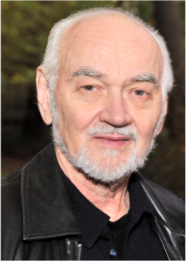Featuring internationally known researchers on human-animal interaction
 Alan Beck, Sc. D.
Dorothy N. McAllister Professor of Animal Ecology Director of Center of the Human-Animal Bond College of Veterinary Medicine Purdue University Leo K. Bustad Visiting Professor |
Alan Beck received his Baccalaureate from Brooklyn College and Master's degree from California State University at Los Angeles. He received his Doctorate in Animal Ecology from The Johns Hopkins University School of Public Health. He has studied the ecological and public health implications of dogs in Baltimore, St. Louis, New York, and along the United States-Mexican border. His book, The Ecology of Stray Dogs: A Study of Free-Ranging Urban Dogs is considered a classic in the field of urban ecology and was republished by Purdue University Press in 2002. Together with Dr. Aaron Katcher, he edited the book, New Perspectives on Our Lives with Companion Animals, and co-authored the popular book, Between Pets and People: The Importance of Animal Companionship, first published in 1983 then revised in 1996. He edited, The Health Benefits of Dog Walking for Pets and People (with Drs. Rebecca Johnson and Sandra McCune) in 2011. Dr. Beck has published more than 70 professional articles, 75 book chapters, over 40 popular articles, and 5 books on the nature of our relationship with animals and he is a founding board member of the Delta Society. Dr. Beck directed the animal programs for the New York City Department of Health for five years, and then was the Director of the Center for the Interaction of Animals and Society at the University of Pennsylvania, School of Veterinary Medicine for 10 years. In 1990, Dr. Beck became the “Dorothy N. McAllister Professor of Animal Ecology” and Director of the Center for the Human-Animal Bond at the School of Veterinary Medicine, Purdue University, West Lafayette, Indiana. The Center was established to develop a comprehensive understanding of the relationship between people and their companion animals. |
 Photo credit: Vegar Abelsnes
Alexandra Horowitz, Ph. D.
Associate Professor, Psychology, Barnard College, Columbia University
Author of the #1 New York bestseller, Inside of a Dog: What Dogs See, Smell and Know
Leo K. Bustad Visiting Professor |
Alexandra Horowitz is an Adjunct Associate Professor in the Department of Psychology at Barnard College in New York, where she teaches courses on psychology and animal behavior. She is the author of the #1 New York Times bestseller “Inside of a Dog: What Dogs See, Smell, and Know.” Her studies on dogs have explored their ‘guilty look,’ sense of fairness, play signaling, and olfactory abilities, among other topics. She received her M.S. and Ph.D. in Cognitive Science from the University of California, San Diego, and a B.A. in Philosophy from the University of Pennsylvania. Her latest book is “On Looking: Eleven Walks with Expert Eyes.” |
 Philip Tedeschi, MSSW Clinical Professor
Executive Director, Institute for Human-Animal Connection
Graduate School of Social Work
University of Denver
Leo K. Bustad Visiting Professor |
Clinical Professor Philip Tedeschi is the Executive Director of the Institute for Human-Animal Connection at the University of Denver within the Graduate School of Social Work. He has been with the University of Denver for 19 years and is the founder of the Animal Assisted Social Work Program. He is recognized for expertise in the clinical methods for Animal Assisted Interventions and coordinates the school's Animal-Assisted Social Work Certificate program for Master of Social Work (MSW) students, as well as the Animals and Human Health online professional development certificate program. He received his MSSW degree for the University of Wisconsin-Madison, where his specialization was the therapeutic connection between people and animals. He teaches MSW courses in forensic social work, human-animal interaction and animal welfare, human ecology and international social work in areas such as East Africa.
Philip’s research, scholarship, presentations, training and community practice work have focused on human-animal interaction, conservation and environmental social work, experiential therapy and forensic social work practice. Philip is a certified Master Therapeutic Riding Instructor, former course director and instructor with Outward Bound, wilderness medical technician, forensic evaluator and has many years of experience in non-traditional therapeutic approaches with children, adults and families, as well as program development and intervention in interpersonal violence including, assessment and intervention with animal abuse. Philip has been recognized as a graduate level educator and has remained active as a social work practitioner with over 30 year of practice experience. He serves on numerous national organization board of directors including the Delta Pet Partners National Board, The Green Chimneys Institute Board of Advisors, The Horses and Humans Research Foundation and the African Network for Animal Welfare and The National Link Coalition among others. |
 Jaak Panksepp, Ph. D.
Professor and Baily Endowed Chair of Animal Well-being Science
College of Veterinary Medicine
Washington State University |
Jaak Panksepp, Ph.D. Professor and Baily Endowed Chair of Animal Well-Being Science, College of Veterinary Medicine, Washington State University. His scientific contributions include more than 400 papers devoted to the study of basic emotional and motivational processes of the mammalian brain. His recent work has focused primarily on the subcortical brain mechanisms of sadness (separation distress) and joy (play and animal laughter), work that has implications for the treatment of depression and ADHD. His work is informed by exploring the consequences of basic knowledge about emotional endophenotypes for better understanding of human mental health. His monograph Affective Neuroscience (Oxford, 1998) outlined ways to understand brain affective processes neuroscientifically;Textbook of Biological Psychiatry (Wiley, 2004) focused on how elucidation of emotional processes can facilitate psychiatric practice; and Archaeology of Mind (Norton, 2012) summarized how such knowledge can inform psychotherapeutic practice. |


